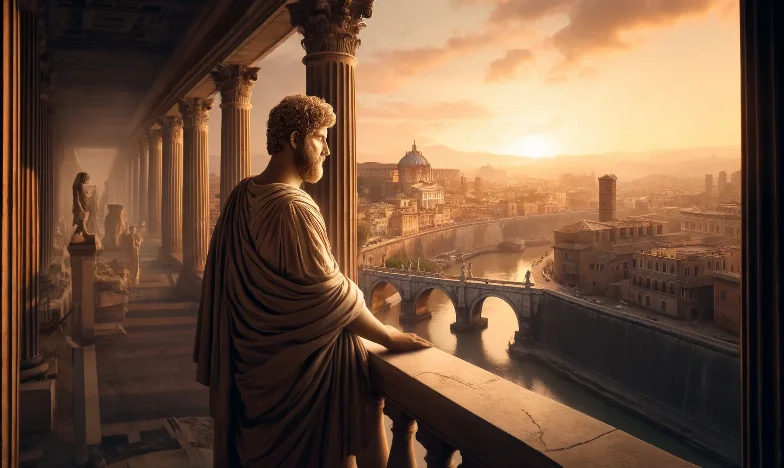The Stoic Emperor: A Tale of Marcus Aurelius
The Stoic Emperor
The marble bust of Marcus Aurelius, timeless and serene, gazed down upon the bustling city of Rome. The Emperor himself stood on the balcony of the imperial palace, his eyes sweeping over the sprawling metropolis that was the heart of his empire. The quote etched into his memory, “I cannot escape death, but at least I can escape the fear of it,” resonated with him more deeply than ever as he faced the turbulent challenges of his reign.
It was the year 175 AD, and Marcus Aurelius was beset with troubles both within and outside the empire. Plagues ravaged the population, the Parthian War drained resources, and unrest simmered on the Germanic frontiers. Yet, despite the ceaseless pressures, Marcus found solace in his Stoic philosophy. His meditations provided a sanctuary, a place where he could reflect on the impermanence of life and the importance of inner peace.
One evening, after a particularly grueling day of council meetings and diplomatic negotiations, Marcus retreated to his private study. He sat at his wooden desk, a single oil lamp casting a warm glow over his scrolls and writings. His hand hovered over a fresh piece of parchment as he contemplated his next entry.
“To be a Stoic is to accept that death is inevitable,” he wrote, his script steady and deliberate. “Yet, it is the fear of death that is our true enemy. In overcoming this fear, we liberate ourselves to live fully and virtuously.”
A soft knock on the door interrupted his thoughts. It was Faustina, his beloved wife. She entered quietly, her presence a calming influence on the Emperor’s troubled mind. “Marcus,” she said gently, “you look weary. Come, let us walk in the gardens.”
He nodded, grateful for her understanding. Together, they strolled through the imperial gardens, the cool night air filled with the scent of blooming jasmine. As they walked, Marcus shared his reflections with Faustina, his confidante and equal in wisdom.
“Today, I received news of yet another uprising in Germania,” he confided. “The legions are stretched thin, and I fear for the stability of the empire.”
Faustina listened intently, her brow furrowing with concern. “You have faced many trials before, my love,” she reminded him. “Your strength lies not just in your command but in your ability to inspire courage and resolve in others.”
Marcus paused, taking in her words. “You are right,” he said, a faint smile touching his lips. “It is not the absence of challenges that defines us, but how we rise to meet them.”
As they continued their walk, Marcus felt a renewed sense of purpose. The teachings of Stoicism had always guided him, and now, more than ever, he needed to embody those principles. The fear of death and failure could not dictate his actions. Instead, he would focus on justice, wisdom, and the well-being of his people.
The next morning, Marcus convened a meeting with his generals and advisors. His demeanor was calm and resolute, a stark contrast to the anxiety that had gripped the court. “We must address the unrest in Germania with both strength and diplomacy,” he declared. “Our legions will march, but we will also seek dialogue with the tribal leaders. Peace, when possible, is always preferable to war.”
His advisors nodded in agreement, heartened by the Emperor’s clear vision. Marcus then turned his attention to the health crisis within the city. “The plague continues to spread,” he said, “but we must not give in to despair. Let us allocate more resources to our healers and ensure that every citizen has access to care.”
Throughout the day, Marcus worked tirelessly, his actions guided by the Stoic ideals he held dear. In the face of adversity, he remained a pillar of strength and wisdom, inspiring those around him to act with courage and integrity.
As night fell once more, Marcus returned to his study. He picked up his quill and began to write, his thoughts flowing freely onto the parchment. “In the face of death, we find clarity,” he mused. “It is in our acceptance of life’s impermanence that we discover true freedom. Let this be a lesson to all who seek to live virtuously: fear not the end, but rather, embrace each moment with gratitude and purpose.”
The bust of Marcus Aurelius, a testament to his enduring legacy, continued to watch over Rome. It stood as a reminder of a time when an Emperor’s wisdom and courage helped steer the empire through its darkest hours. And though Marcus could not escape death, his teachings lived on, guiding future generations in the pursuit of a life well-lived.
